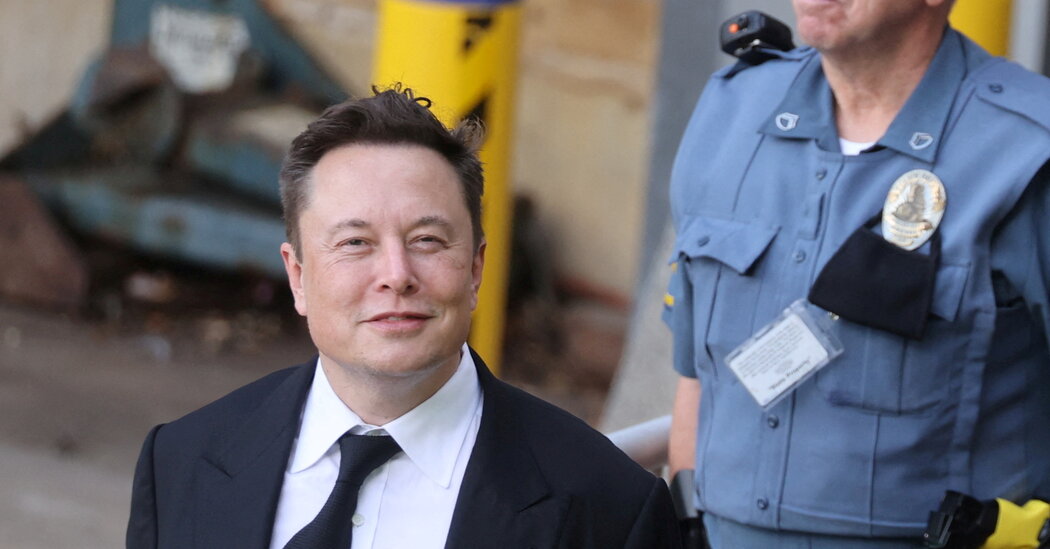Twitter sued Elon Musk Tuesday over his attempt to end a $44 billion acquisition deal. Now the legal battle is headed to a Delaware courtroom, where a 230-year-old courthouse that is a prime location for business battles will hear the case.
The court is known as Delaware’s Court of Chancery. Here’s what you need to know about it.
What is the Delaware Court of Chancery?
Established in 1792, the Delaware Court of Chancery is one of three courts established by the state constitution, alongside the Supreme Court and Superior Courts. It is known as a court of equity, rather than a court, because it allows for more flexible resolutions than the law formally provides.
The court’s jurisdiction is to make decisions in cases where the law is not explicit about the results and where a party wants specific action beyond monetary damages, said Charles Elson, founder and director of the John L. Weinberg Center. for Corporate Governance at the University of Delaware. Twitter’s lawsuit against Mr. Musk, for example, is pushing for the acquisition to be completed, and the court could demand that via injunction, he said.
“It’s situational,” Mr. Elson said. “You have a broad statute, which Delaware has, and you leave the rest to the judges.”
Chancellery courts often deal with wills, adoptions, divorces and child custody cases. Delaware, Mississippi, and Tennessee are the only states with distinct chancellery courts, descending from the English judicial tradition.
Read more about Elon Musk and Twitter
In Delaware, the Chancery Court has one chancellor, the chief justice, and six vice chancellors. The governor appoints the chancellor and vice chancellor, who must be confirmed by the state Senate to serve 12-year terms. The Delaware Chancellery Courthouses are located in Wilmington, Dover, and Georgetown.
Why would the Chancery Court hear a Twitter case?
Like many US companies, Twitter is registered as a company in Dover, Del. According to the State Division of Corporations, there are more than 1.8 million companies in the state, including more than two-thirds of the Fortune 500 companies.
As a result, the Delaware’s Court of Chancery has heard many types of corporate cases over the years and built up expertise in this area. Because of that knowledge, many companies want to have cases dealt with by the courts, which also makes the arc of legal disputes more predictable there.
“If you want experts to resolve your business disputes, you generally prefer Delaware,” said Joseph Grundfest, a professor of corporate governance at Stanford Law School. “You may be able to fool some judges somewhere, but you are less likely to fool these judges because they see this all the time.”
The Chancellery is well versed in M&A disputes. Over the past two decades, it has ruled in litigation, such as when a dissident shareholder fought a 2002 merger between computer companies HP and Compaq; when the chemical company Hexion filed a lawsuit in 2008 to end its merger with another chemical company, Huntsman; and when luxury companies LVMH Moët Hennessy Louis Vuitton and Tiffany & Company sued each other over a takeover in 2020.
What happens if a case goes to the Chancery Court?
Cases in the Court of Chancery generally follow the same process, similar to most civil courts in other states. Either party can file an application for summary judgment, which means asking the court to rule on all or parts of the case without starting a lawsuit. If the case goes to trial, the judge establishes the facts based on evidence provided through documents and testimony, and then decides on the resolution.
The chancellor, Kathaleen McCormick, nominates himself or one of six vice chancellors to chair the case. If a chancellor has a conflict of interest, such as having worked for Mr. Musk or Twitter in the past, he or she cannot preside. Cases are then decided by the presiding judge and not by a jury, although the judge may call an advisory jury to assist in deliberations. The judge’s decision may be appealed to the State Supreme Court, whose decision is final.
Have Mr Musk and Twitter dealt with cases in the Chancery Court?
Yes.
In 2016, Mr. Musk’s auto company, Tesla, announced a $2.6 billion acquisition of solar panel energy company SolarCity. Tesla shareholders filed a lawsuit to prevent the deal from going through, a case that ended up in the Delaware’s Court of Chancery. The shareholders accused Mr. Musk of pressuring the Tesla board to effectively rescue the struggling SolarCity, which the billionaire’s cousins had founded. The court ruled in Musk’s favor in April, a decision that has been appealed to the state’s Supreme Court.
Twitter has also faced court in several cases, including a lawsuit filed in May by a police pension fund in Orlando, Florida, to delay the deal with Mr. Musk. In 2020, Twitter shareholders also sued the company in the Chancery Court, accusing executives of inflating user statistics. The court approved a $38 million settlement last year.

